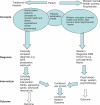Profiles and outcome of traditional healing practices for severe mental illnesses in two districts of Eastern Uganda
- PMID: 21845144
- PMCID: PMC3150106
- DOI: 10.3402/gha.v4i0.7117
Profiles and outcome of traditional healing practices for severe mental illnesses in two districts of Eastern Uganda
Abstract
Background: The WHO estimates that more than 80% of African populations attend traditional healers for health reasons and that 40%-60% of these have some kind of mental illness. However, little is known about the profiles and outcome of this traditional approach to treatment.
Objective: The purpose of this study was to describe the profiles and outcome of traditional healing practices for severe mental illnesses in Jinja and Iganga districts in the Busoga region of Eastern Uganda.
Methods: Four studies were conducted. Study I used focus group discussions (FGDs) with case vignettes with local community members and traditional healers to explore the lay concepts of psychosis. Studies II and III concerned a cross-sectional survey of patients above 18 years at the traditional healer's shrines and study IV was made on a prospective cohort of patients diagnosed with psychosis in study III. Manual content analysis was used in study I; quantitative data in studies II, III, and IV were analyzed at univariate, bivariate, and multivariate levels to determine the association between psychological distress and socio-demographic factors; for study IV, factors associated with outcome were analyzed. One-way ANOVA for independent samples was the analysis used in Study IV.
Results: The community gave indigenous names to psychoses (mania, schizophrenia, and psychotic depression) and had multiple explanatory models for them. Thus multiple solutions for these problems were sought. Of the 387 respondents, the prevalence of psychological distress was 65.1%, where 60.2% had diagnosable current mental illness, and 16.3% had had one disorder in their lifetime. Over 80% of patients with psychosis used both biomedical and traditional healing systems. Those who combined these two systems seemed to have a better outcome. All the symptom scales showed a percentage reduction of more than 20% at the 3- and 6-month follow-ups.
Conclusion: Traditional healers shoulder a large burden of care of patients with mental health problems. This calls for all those who share the goal of improving the mental health of individuals to engage with traditional healers.
Keywords: Western medicine; mental illness; outcome; traditional healers.
Figures
Comment in
-
Traditional healers for mental health care in Africa.Glob Health Action. 2011;4. doi: 10.3402/gha.v4i0.7956. Epub 2011 Aug 3. Glob Health Action. 2011. PMID: 21845145 Free PMC article. No abstract available.
Similar articles
-
The prevalence and severity of mental illnesses handled by traditional healers in two districts in Uganda.Afr Health Sci. 2009 Aug 1;9 Suppl 1(Suppl 1):S16-22. Afr Health Sci. 2009. PMID: 20589155 Free PMC article.
-
Explanatory models of mental disorders and treatment practices among traditional healers in Mpumulanga, South Africa.Afr J Psychiatry (Johannesbg). 2010 Sep;13(4):284-90. doi: 10.4314/ajpsy.v13i4.61878. Afr J Psychiatry (Johannesbg). 2010. PMID: 20957328
-
Psychological distress and associated factors among the attendees of traditional healing practices in Jinja and Iganga districts, Eastern Uganda: a cross-sectional study.Int J Ment Health Syst. 2008 Dec 23;2(1):16. doi: 10.1186/1752-4458-2-16. Int J Ment Health Syst. 2008. PMID: 19105804 Free PMC article.
-
A narrative analysis of the link between modern medicine and traditional medicine in Africa: a case of mental health in Uganda.Brain Res Bull. 2019 Feb;145:109-116. doi: 10.1016/j.brainresbull.2018.07.018. Epub 2018 Jul 31. Brain Res Bull. 2019. PMID: 30075200 Review.
-
Systematic reviews of the effectiveness of day care for people with severe mental disorders: (1) acute day hospital versus admission; (2) vocational rehabilitation; (3) day hospital versus outpatient care.Health Technol Assess. 2001;5(21):1-75. doi: 10.3310/hta5210. Health Technol Assess. 2001. PMID: 11532238 Review.
Cited by
-
A narrative review of factors influencing detection and treatment of depression in Vietnam.Int J Ment Health Syst. 2013 May 6;7(1):15. doi: 10.1186/1752-4458-7-15. Int J Ment Health Syst. 2013. PMID: 23647977 Free PMC article.
-
Holy water and biomedicine: a descriptive study of active collaboration between religious traditional healers and biomedical psychiatry in Ethiopia.BJPsych Open. 2021 May 5;7(3):e92. doi: 10.1192/bjo.2021.56. BJPsych Open. 2021. PMID: 33947496 Free PMC article.
-
Traditional healers for mental health care in Africa.Glob Health Action. 2011;4. doi: 10.3402/gha.v4i0.7956. Epub 2011 Aug 3. Glob Health Action. 2011. PMID: 21845145 Free PMC article. No abstract available.
-
Next steps for meeting the needs of people with severe mental illness in low- and middle-income countries.Epidemiol Psychiatr Sci. 2017 Aug;26(4):348-354. doi: 10.1017/S2045796016001013. Epub 2016 Dec 20. Epidemiol Psychiatr Sci. 2017. PMID: 27995844 Free PMC article.
-
Psychosocial health in adolescent unmarried motherhood in rural Uganda: Implications for community-based collaborative mental health education, and empowerment strategies in the prevention of depression and suicide.Transcult Psychiatry. 2023 Jun;60(3):537-551. doi: 10.1177/13634615221147361. Epub 2023 Jan 10. Transcult Psychiatry. 2023. PMID: 36628461 Free PMC article.
References
-
- WHO. Geneva: Author; 2002. WHO policy perspective on medicines – traditional medicine – growing needs and potentials.
-
- Eisenberg DM, Davis RB, Ettner SL, Appel S, Wilkey S, Van Rompay M, et al. Trends in alternative medicine use in the United States, 1990–1997: results of a follow-up national survey. JAMA. 1998;280:1569–75. - PubMed
-
- Unutzer J, Klap R, Sturm R, Young AS, Marmon T, Shatkin J, et al. Mental disorders and the use of alternative medicine: results from a national survey. Am J Psychiatry. 2000;157:1851–7. - PubMed
-
- Okello E, Musisi S. Depression as a clan illness (eByekika): an indigenous model of psychotic depression among the Baganda of Uganda. J World Cultural Psychiatry Res Rev. 2006;1:60–73.
-
- Patel V. Explanatory models of mental illness in Sub-Saharan Africa. Soc Sci Med. 1995;40:1291–8. - PubMed
Publication types
MeSH terms
LinkOut - more resources
Full Text Sources
Medical


